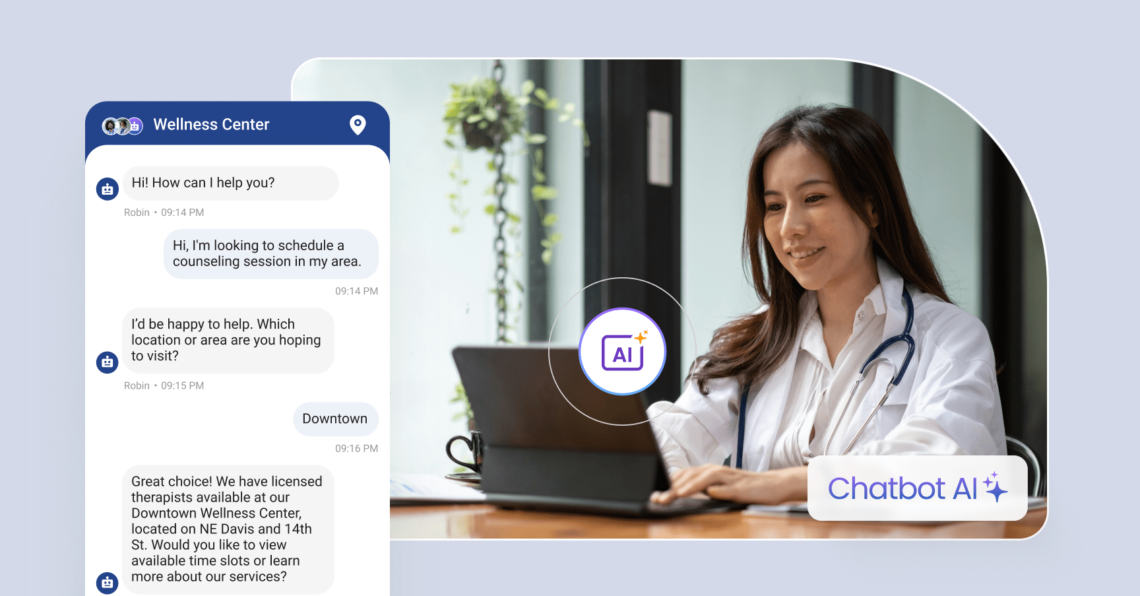For multi-location healthcare providers in the US, keeping patients engaged while maintaining operational efficiency has become a serious challenge. Traditional communication channels are falling short, whereas overburdened staff, inconsistent messaging, and rising patient expectations for faster, more personalized care have exposed their limits. And generic chatbots? They’re simply not enough.
Conversational AI in healthcare offers a better approach. It automates patient interactions through virtual assistants while aligning with HIPAA standards, clinical workflows, and your brand voice. However, success depends on one thing: using AI that’s purpose-built for the healthcare industry.
In this blog post, you’ll learn about conversational AI, how it drives patient engagement, and how healthcare businesses across the US use it to deliver better care with fewer resources.
Table of contents
- What is conversational AI for healthcare?
- Benefits of implementing conversational AI for healthcare
- Applications of conversational AI in healthcare businesses
- Implementing conversational AI in healthcare
- How to choose the right tool to implement conversational AI for healthcare
- Birdeye: Delivering quality conversational AI tailored to your healthcare brand
- A smarter way to scale patient care
- FAQs on conversational AI for healthcare
- Outshine competitors and improve patient experience with Birdeye
What is conversational AI for healthcare?
Conversational AI for healthcare uses artificial intelligence technologies, especially those powered by natural language processing and machine learning, to automate and enhance communication between patients and healthcare providers. These systems simulate human conversations in real time and can understand, process, and respond to patient inquiries across platforms like websites, SMS, patient portals, and even voice calls.
For multi-location healthcare organizations, this means deploying conversational AI tools that can handle appointment scheduling, triage, follow-up care, and billing questions, without requiring additional headcount. Unlike generic chatbots, conversational AI in the healthcare industry is trained to operate within the healthcare context, ensuring that it understands medical terminology, patient needs, and compliance requirements.
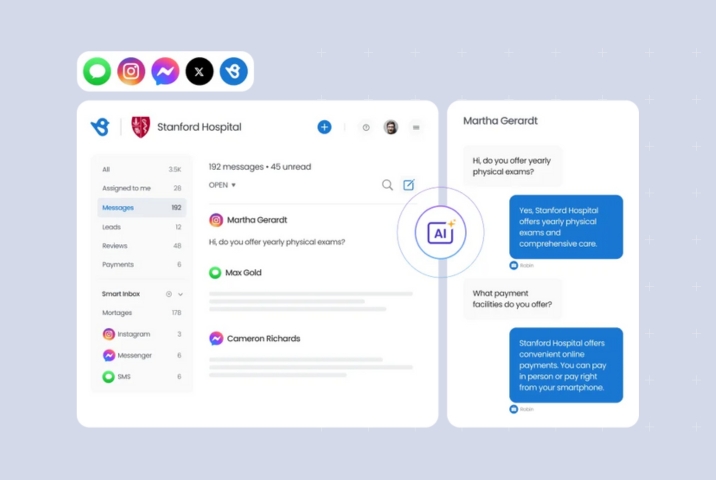
This AI technology doesn’t replace doctors; it enhances the care journey by supporting staff, streamlining routine tasks, and making it easier for patients to access the care they need. From automating administrative tasks to improving patient outcomes, conversational AI systems are becoming a critical component of modern healthcare operations.
Benefits of implementing conversational AI for healthcare
Implementing conversational AI in healthcare isn’t just about automating responses; it’s about improving the entire patient experience while driving efficiency across your organization. For multi-location healthcare providers, AI tools offer a way to standardize service, stay responsive, and meet growing patient expectations without straining your team.
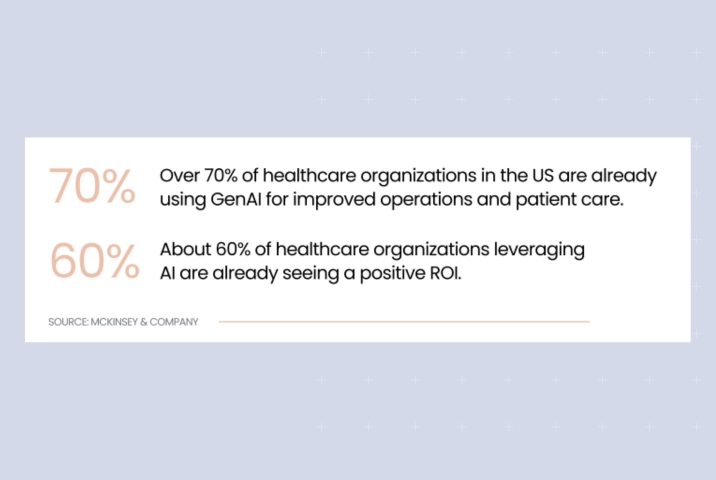
Here’s how:
Higher client engagement rates
AI-powered virtual assistants respond instantly to patient inquiries, day or night. This 24/7 availability increases interaction rates, keeps patients engaged, and reduces drop-offs caused by long wait times.
Increased patient retention rates
When patients feel heard and supported at every step, whether booking, reminders, or follow-ups, they’re more likely to return. Conversational AI helps deliver those consistent, proactive touchpoints.
Streamline brand voice management
Conversational AI solutions built with Brand AI can reflect your unique tone and messaging across all locations. This creates a seamless brand experience, even when different teams handle different locations.
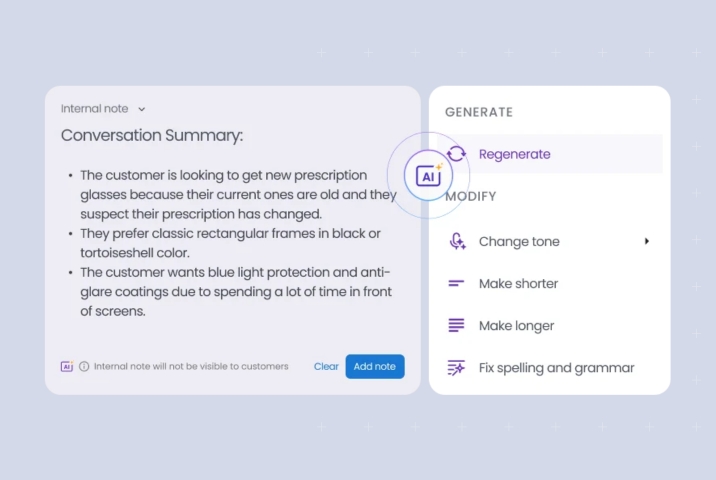
Stronger online reputation
Quick responses to questions, reminders, and even collecting patient feedback lead to higher patient satisfaction scores and more positive online reviews. AI makes it easier to engage at scale.
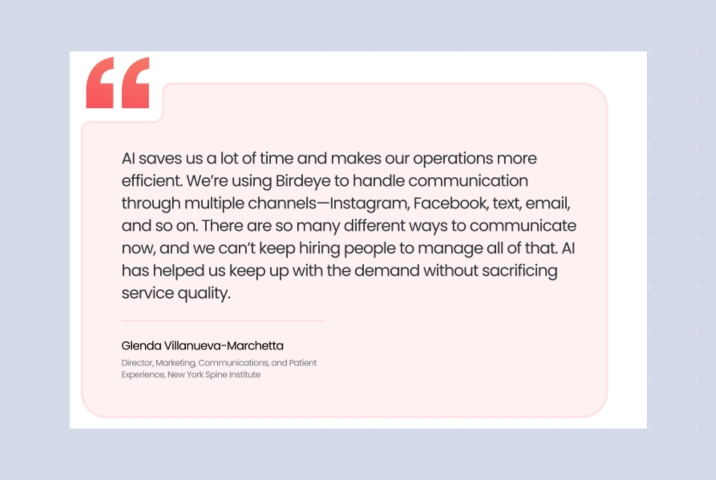
Increased operational efficiency
From automating administrative tasks to routing patient queries, conversational AI in healthcare improves how teams manage time and resources, giving staff more time to focus on high-value patient care.
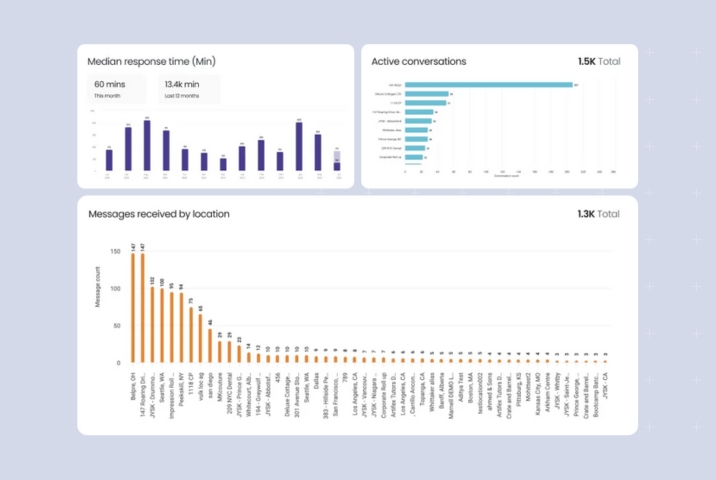
Applications of conversational AI in healthcare businesses
For multi-location healthcare providers, conversational AI solutions can step in at every touchpoint in the customers’ journey, from front-desk automation to ongoing care support. This means a consistent, scalable way to improve service delivery, regardless of where the patient is.
Below are practical applications of implementing conversational AI in healthcare that bring measurable results.
Appointment scheduling and reminders
AI agents can manage scheduling, send automated reminders, and even reschedule missed appointments—all without staff intervention. For a large group practice or chain of clinics, this eliminates hours of manual coordination and reduces no-shows across locations.
Why it matters: Streamlines operations, improves patient attendance, and keeps calendars full without increasing administrative overhead.
Telehealth support with 24/7 virtual assistants
Virtual health assistants can answer common questions, guide patients through telehealth platform access, and even triage symptoms before the video visit. This ensures patients across time zones get timely help, even outside office hours.
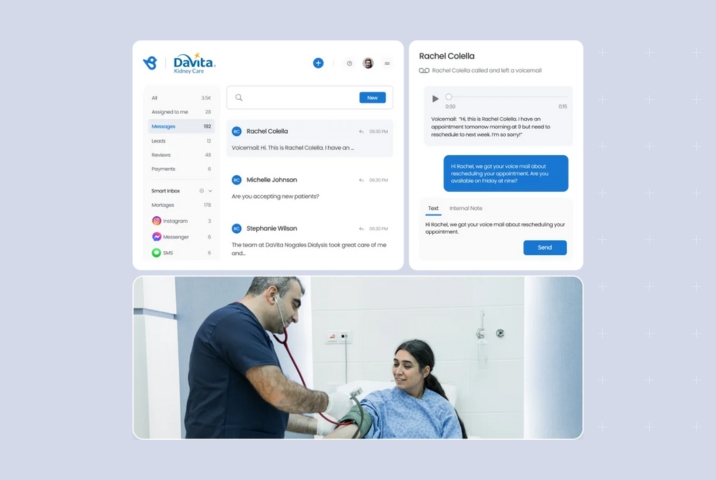
Why it matters: Enhances availability, supports healthcare professionals, and delivers round-the-clock support without the need for overnight staff.
Basic triage before appointments for efficiency
AI tools can ask symptom-based questions ahead of a visit, route the case appropriately, and flag emergencies. This early filtering saves providers time and ensures the right care at the right time.

Why it matters: It speeds up in-clinic workflows, reduces waiting room backups, and improves clinical workflows, especially in urgent care and family practice networks.
Explaining lab reports and results to patients
Instead of waiting for a call-back, patients can ask questions about lab terms, timelines, and next steps, which are answered by trained AI assistants using plain, human language.
Why it matters: Improves patient satisfaction, empowers patients to understand their health, and lightens the load on care teams.
Collecting patient feedback
Automated follow-ups can request patient reviews post-appointment and escalate negative feedback in real time to the right location manager.
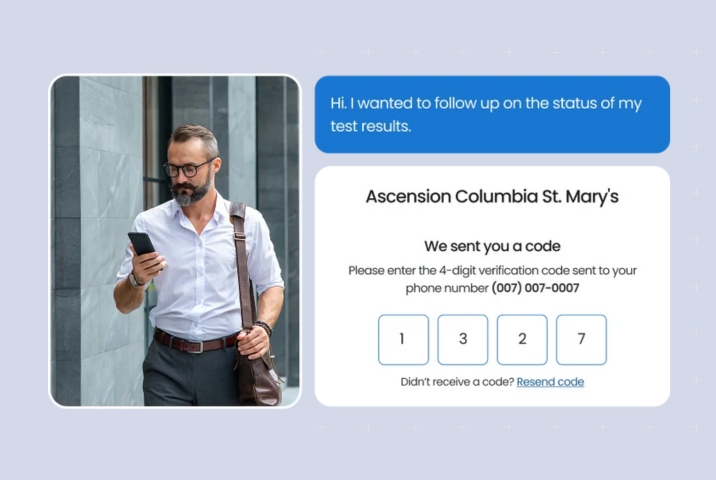
Why it matters: It helps boost online reputation, identify service gaps early, and support continuous improvement across locations.
Insurance processing assistance
AI can walk patients through coverage FAQs, explain EOBs, and collect missing insurance details upfront, reducing call volumes for billing teams.
Why it matters: Reduces confusion, increases collection rates, and improves patient experience with less back-and-forth.
Preventive care with medication and follow-up reminders
Smart reminders for flu shots, annual exams, or refill prompts can be tailored by age, diagnosis, or care plan—automated and location-specific.
Why it matters: Supports chronic disease management, improves patient outcomes, and boosts adherence to care plans without extra manual tracking.
Providing multilingual support for a diverse patient base
AI tools can communicate fluently in multiple languages, helping providers serve non-English-speaking communities with dignity and clarity.
Why it matters: Expands patient access, improves equity, and helps meet the needs of multilingual communities, especially in urban or border-state clinics.
Implementing conversational AI in healthcare
Bringing conversational AI technology into a healthcare environment isn’t just plug-and-play. For multi-location healthcare organizations, success depends on strategic implementation, ensuring the tools are secure, accurate, and aligned with both clinical standards and brand voice. Here are the top challenges to consider:
Ensuring HIPAA compliance
Patient conversations may contain sensitive patient data, so your conversational AI systems must be built with HIPAA and other US healthcare regulations in mind. This includes secure data storage, encrypted channels, and robust security measures to prevent breaches.
Why it matters: Compliance protects your business from legal risks while safeguarding patient trust across all locations.
Retaining the human touch
Patients don’t want robotic, scripted replies, especially in high-stakes or emotional scenarios. The best conversational AI for healthcare blends marketing automation with empathy, escalating to human agents when needed and maintaining a warm, helpful tone throughout every interaction.
Why it matters: Preserving patient satisfaction while using AI means balancing efficiency with empathy, especially across large, distributed teams.
How to choose the right tool to implement conversational AI for healthcare
Choosing the right conversational AI solutions is critical, especially for healthcare systems managing dozens or hundreds of locations. A misstep could mean compliance issues, fragmented experiences, or tools that simply don’t scale. Here’s what to prioritize:
Purpose-built for the healthcare industry
Generic chatbots won’t cut it. You need conversational AI tools trained on medical terminology, healthcare context, and patient behavior tools that understand how to triage a symptom query or explain lab results in human language.
Pro tip: Look for platforms that specialize in healthcare conversational AI, not just customer support.
Built for brand consistency across locations
For multi-location practices, it’s essential to maintain a unified voice across all touchpoints. Every message, from appointment reminders to feedback requests, should mirror your brand tone and values.
Why it matters: Consistent communication builds patient trust and brand credibility.
Leverage conversational AI in your healthcare business with Birdeye
Want to see the impact of Birdeye on your business? Watch the Free Demo Now.
Easy integration with existing systems
Your AI tools should integrate smoothly with electronic health records, scheduling software, and other backend platforms. This ensures seamless workflows and minimizes the risk of data silos.
Ensure support for APIs, EHR compatibility, and easy onboarding for clinical and admin teams.
Scalable for large healthcare systems
As your practice grows, so should your AI. Choose conversational AI platforms that can support multiple locations, diverse specialties, and growing volumes of patient inquiries, without compromising speed or accuracy.
Why it matters: Scalable tools help you serve more patients with the same resources.
Includes analytics and feedback
Go beyond automation. The right solution should analyze patient interactions, monitor satisfaction scores, and help you refine conversations for better patient outcomes.
AI-driven insights can surface trends across locations to guide broader service improvements.
Birdeye: Delivering quality conversational AI tailored to your healthcare brand
Birdeye offers conversational AI solutions purpose-built for healthcare organizations. These solutions combine industry-trained intelligence with brand-specific tone, compliance, and scalability.
Whether you’re running a multi-location urgent care chain or a growing mental health practice, Birdeye’s tools are designed to help you enhance patient engagement, streamline operations, and maintain control over your brand voice at every touchpoint.
Leverage conversational AI to streamline operations and boost patient experience
Want to see the impact of Birdeye on your business? Watch the Free Demo Now.
Brand AI and Industry AI: Purpose-built for your brand
Birdeye’s Brand AI and Industry AI work together to create tailored AI agents that speak your language—literally and figuratively.
- Brand AI is trained on your organization’s specific communication style, ensuring consistency in tone, empathy, and professionalism across locations.
- Industry AI is trained on healthcare-specific data, allowing your AI agents to understand medical terminology, triage requests appropriately, and comply with HIPAA standards.
Together, they power AI that doesn’t just respond—it responds intelligently, accurately, and on-brand.
Quick Care Med: Engaging more patients with AI-powered feedback
Quick Care Med, a fast-growing urgent care network with 15+ locations across Florida, needed a way to collect more patient feedback and respond to reviews without burdening staff. By implementing Birdeye’s platform, including AI-powered review responses and automated feedback collection, they transformed how they managed reputation and patient communication.
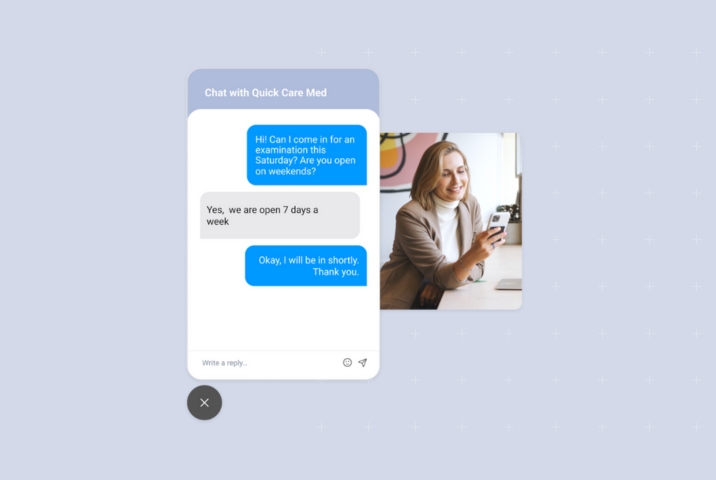
Results:
- 121% increase in Google reviews
- 4.7 average rating across locations
- Streamlined review responses across all clinics
Genesis Counseling Center: Improving engagement for a multi-location mental health provider
Genesis Counseling Center, a behavioral and mental health services provider with 6+ offices across Virginia, wanted to make patient interactions surrounding mental health support more personal, without overwhelming staff. Using Birdeye, they collected patient reviews and engaged patients more effectively through tailored communication.
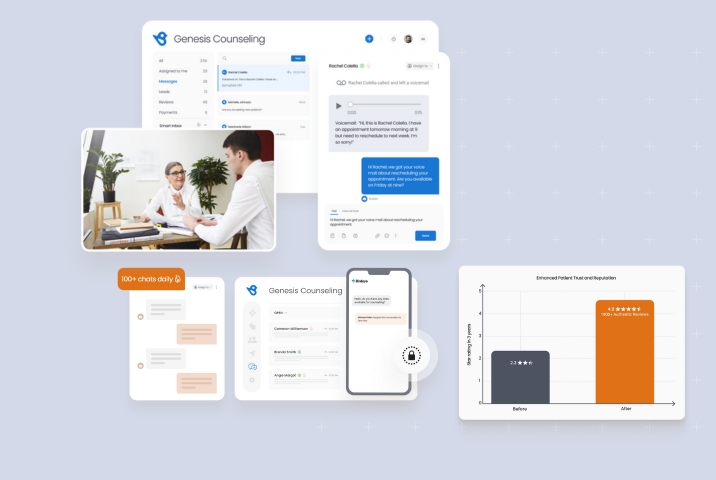
Results:
- 132% increase in review volume
- 40% reduction in no-shows
- Faster engagement for new patient inquiries
A smarter way to scale patient care
Using solutions that incorporate conversational AI in healthcare communications provides a strategic advantage for multi-location healthcare providers looking to scale smarter, serve patients better, and stay competitive. It improves the patient experience, reduces administrative tasks, and supports better overall outcomes.
The key is choosing solutions purpose-built for the healthcare industry that align with your systems, your standards, and your voice.
FAQs on conversational AI for healthcare
Conversational AI tools keep patients informed, supported, and connected throughout their healthcare journey by providing instant, 24/7 responses. This increases trust, follow-through, and patient satisfaction across all locations.
Purpose-built conversational AI for healthcare platforms, like Birdeye, are designed to meet HIPAA standards with encrypted messaging, data security protocols, and audit-ready communication logs.
Look for platforms with easy EHR integration, flexible APIs, and onboarding support. Birdeye’s AI suite, for example, ensures seamless integration of existing systems without disrupting clinical workflows.
Outshine competitors and improve patient experience with Birdeye
Delivering great care isn’t enough anymore. Today’s patients expect fast answers, consistent communication, and personalized support at every step. That’s where Birdeye’s conversational AI comes in. Built specifically for the healthcare industry, it helps multi-location providers connect, scale, and engage like never before.
With Brand AI and Industry AI, you can create HIPAA-compliant, on-brand AI agents that:
- Automate manual and time-consuming routine tasks
- Respond to patient inquiries across channels, 24/7
- Collect feedback and improve patient satisfaction scores
- Reflect your brand voice across every location
Plus, with integrated tools like Reviews AI, Listings AI, Social AI, and Insights AI, Birdeye helps you build trust, grow reputation, and make smarter decisions—all in one platform.
Ready to modernize patient engagement? Watch a free demo to learn more.

Originally published
